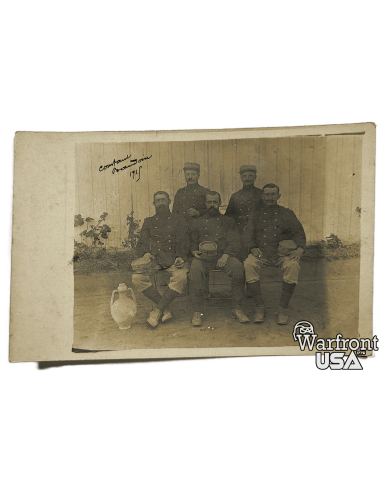Features an image of "5 Soldiers sitting on chairs" with the caption "Constant Baudouin 1915", capturing a moment of respite or camaraderie among soldiers.
Marked as "Carte postale" for correspondence.
Message: A letter to a priest, conveying a personal request: "Monsieur le curé, Vous qui avez donné l'hospitalité à Constant autrefois. J'aime à croire que vous la lui donnerez encore avec plaisir. Il a le front soucieux peut-être pensait-il à moi. Je l'ai reçu depuis la fameuse demande de . Je vous mets son adresse en cas." Translation: "Mister Priest, you who once gave hospitality to Constant. I like to believe that you will give it to him again with pleasure. He looks worried, perhaps he was thinking of me. I have received him since the famous request of . I give you his address in case."
Address: "M Caporal Baudouin Constant au 2 e Régiment D'infanterie Coloniale 9 e Bataillon, 3 Cie 3e escouade à Kashba Tadla (Maroc Occidental)" Translation: "Corporal Constant Baudouin at the 2nd Colonial Infantry Regiment 9th Battalion, 3rd Company, 3rd Squad in Kashba Tadla (Western Morocco)".
This postcard not only serves as a medium for personal communication but also reflects the French colonial involvement in WWI, where soldiers from France served in various colonies like Morocco. The message suggests a relationship of care or mentorship between the soldier and the priest, highlighting the personal networks that sustained soldiers' morale.
Condition: Given its age and historical journey, the envelope exhibits signs of wear such as fading, creases, or minor tears. The condition reflects its passage through wartime postal systems.
Historical Significance: A poignant piece for collectors of WWI memorabilia, particularly those interested in the French colonial forces, personal stories of soldiers, or postal history. It offers a glimpse into the lives of soldiers stationed far from home. Provides insights into the human aspect of war, the role of religion in soldiers' lives, and the communication methods used to maintain personal connections across vast distances.
Note: This WWI postal card is more than just a piece of history; it's a personal narrative that connects the front lines with the home front, illustrating the bonds that soldiers cherished and the support systems that existed beyond the battlefield.





































